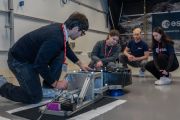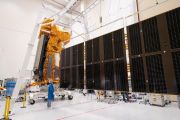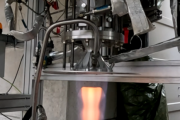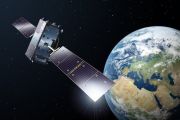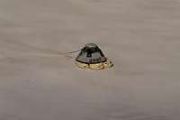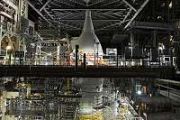
Copernical Team
Press briefing Webb Telescope
 Video:
00:45:03
Video:
00:45:03
Replay of the 16 December 2021 online press briefing about the James Webb Space Telescope.
Speakers:
- Günther Hasinger, ESA Director of Science
- Daniel Neuenschwander, ESA Director of Space Transportations
- Thomas Zurbuchen, NASA’s Associate Administrator for science
- Antonella Nota, ESA Webb Project Scientist
- Gillian Wright, European Principal Investigator for the MIRI instrument
Developed and constructed over more than 30 years, Webb is a remarkable feat of engineering and technology – with the largest astronomical mirror ever flown in space, sophisticated new scientific instruments, and a sunshield the size of a tennis court.
Webb is designed to answer outstanding questions about the
Year in images 2021

Year in images 2021
Our year through the lens: a selection of our favourite images for 2021
DiCaprio and Lawrence big up science in doomsday comedy
 For Hollywood A-listers Leonardo DiCaprio and Jennifer Lawrence, their new end-of-the-world comedy was a chance to send a little respect back to scientists.
In "Don't Look Up", released on December 24 on Netflix, they play two astronomers who discover a comet will wipe out life on Earth within six months, but then try in vain to get politicians and the media to take the threat seriously.
For Hollywood A-listers Leonardo DiCaprio and Jennifer Lawrence, their new end-of-the-world comedy was a chance to send a little respect back to scientists.
In "Don't Look Up", released on December 24 on Netflix, they play two astronomers who discover a comet will wipe out life on Earth within six months, but then try in vain to get politicians and the media to take the threat seriously. IXPE Unfolds its Origami Boom for Science
 NASA's newest X-ray observatory - the Imaging X-ray Polarimetry Explorer, or IXPE - extended its boom successfully Dec. 15, giving IXPE the ability to see high-energy X-rays. The mission, which launched on Dec. 9, is one step closer to studying some of the most energetic and mysterious places in the universe in a new way.
The IXPE observatory features thre
NASA's newest X-ray observatory - the Imaging X-ray Polarimetry Explorer, or IXPE - extended its boom successfully Dec. 15, giving IXPE the ability to see high-energy X-rays. The mission, which launched on Dec. 9, is one step closer to studying some of the most energetic and mysterious places in the universe in a new way.
The IXPE observatory features thre Advanced analysis of Apollo sample illuminates Moon's evolution, cooling
 Sophisticated analysis of a rock sample taken from the Moon during the Apollo 17 mission revealed new information about the complex cooling and evolutionary history of the Moon. The findings, from University of Hawai'i (UH) at Manoa researchers, were published in Nature Communications.
Apollo 17 astronauts collected the rock sample troctolite 76535 from the Moon's surface in 1972, and it r
Sophisticated analysis of a rock sample taken from the Moon during the Apollo 17 mission revealed new information about the complex cooling and evolutionary history of the Moon. The findings, from University of Hawai'i (UH) at Manoa researchers, were published in Nature Communications.
Apollo 17 astronauts collected the rock sample troctolite 76535 from the Moon's surface in 1972, and it r ExoMars discovers hidden water in Mars' Grand Canyon
 The ESA-Roscosmos ExoMars Trace Gas Orbiter has spotted significant amounts of water at the heart of Mars' dramatic canyon system, Valles Marineris.
The water, which is hidden beneath Mars' surface, was found by the Trace Gas Orbiter (TGO)'s FREND instrument, which is mapping the hydrogen - a measure of water content - in the uppermost metre of Mars' soil.
While water is known to exi
The ESA-Roscosmos ExoMars Trace Gas Orbiter has spotted significant amounts of water at the heart of Mars' dramatic canyon system, Valles Marineris.
The water, which is hidden beneath Mars' surface, was found by the Trace Gas Orbiter (TGO)'s FREND instrument, which is mapping the hydrogen - a measure of water content - in the uppermost metre of Mars' soil.
While water is known to exi To Seitah and Back
 Six months ago, we began the dedicated investigation of the Jezero crater floor, and now in December 2021 we are more than halfway through this first science campaign. Since our first sampling experience at Roubion and our first sample pair from the Rochette rock, we have collected a second sample pair, this time from a region of the crater floor called Seitah at the Brac rock. As we now gear up
Six months ago, we began the dedicated investigation of the Jezero crater floor, and now in December 2021 we are more than halfway through this first science campaign. Since our first sampling experience at Roubion and our first sample pair from the Rochette rock, we have collected a second sample pair, this time from a region of the crater floor called Seitah at the Brac rock. As we now gear up Locked in stone: Research may answer the question of Mars' missing water
 Rivers and streams once flowed across the surface of Mars, etching channels still evident on the planet's surface today. Water in lakes once lapped ancient shores.
All told, the geological evidence adds up to an ocean's worth of water, noted Geological Sciences and Environmental Studies Professor David Jenkins. But today, Mars' red sands appear bone-dry. Where did all that water go?
Rivers and streams once flowed across the surface of Mars, etching channels still evident on the planet's surface today. Water in lakes once lapped ancient shores.
All told, the geological evidence adds up to an ocean's worth of water, noted Geological Sciences and Environmental Studies Professor David Jenkins. But today, Mars' red sands appear bone-dry. Where did all that water go? NASA's Perseverance Mars Rover Makes Surprising Discoveries
 Scientists with NASA's Perseverance Mars rover mission have discovered that the bedrock their six-wheeled explorer has been driving on since landing in February likely formed from red-hot magma. The discovery has implications for understanding and accurately dating critical events in the history of Jezero Crater - as well as the rest of the planet.
The team has also concluded that rocks in
Scientists with NASA's Perseverance Mars rover mission have discovered that the bedrock their six-wheeled explorer has been driving on since landing in February likely formed from red-hot magma. The discovery has implications for understanding and accurately dating critical events in the history of Jezero Crater - as well as the rest of the planet.
The team has also concluded that rocks in NASA 'Fires Up' Artemis RS-25 Rocket Engines with New Components
 NASA conducted a successful full-duration test Dec. 15 to begin a new series of testing for state-of-the-art RS-25 engines to help power the agency's Space Launch System (SLS), America's new deep-space rocket, on future missions to the Moon and Mars.
The first hot fire of the new series was conducted for a full-duration 500 seconds on the Fred Haise Test Stand (formerly A-1 Test Stand) at
NASA conducted a successful full-duration test Dec. 15 to begin a new series of testing for state-of-the-art RS-25 engines to help power the agency's Space Launch System (SLS), America's new deep-space rocket, on future missions to the Moon and Mars.
The first hot fire of the new series was conducted for a full-duration 500 seconds on the Fred Haise Test Stand (formerly A-1 Test Stand) at 














